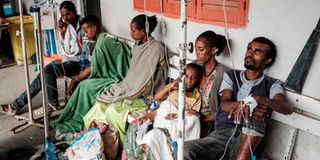Tigray conflict: Patients, medical workers die as drug shortage bites

People wait on a bench for medical treatments at Mekelle General Hospital in Mekele, in Tigray region on June 24, 2021
Health workers in Ethiopia's conflict-ravaged Tigray region said more patients have been dying due to an acute shortage of medical supplies
In the capital Mekelle, workers at Ayder Referral Hospital, the largest health facility in the region, said on average four to six patients die daily from lack of essential drugs.
Administrator Tewodros Kahsay told BBC Amharic that people are dying of diseases that can be easily treated.
In January, the hospital recorded 117 deaths due to lack of medical supplies.
Doctors blamed the deaths on the ongoing aid blockade imposed by the central government.
Since the Tigray conflict broke out in November 2020, access to basic services such as electricity, healthcare, sanitation, water, telephone, transport and banking have been severely affected.
The Ethiopian government has repeatedly denied those allegations.
Addis Ababa instead accuses Tigray People’s Liberation Front (TPLF) forces, who are fighting government-allied troops in the neighbouring Afar region, for blocking aid delivery corridors to Tigray.
Health workers dying
Mr Kahsay said deaths due to a shortage of medicines and medical care was taking a toll on patients and health professionals.
"Our health workers are also dying due to lack of medical services," the health official said.
"Two nurses have died in the last two months. They could have been cured. We were not able to diagnose their conditions, because the MRI machine was not working."
Mr Kahsay said treating patients with chronic diseases such as high blood pressure and kidney disorders has become difficult without laboratory tests, medicines and electricity.
Earlier, Ayder hospital medical staff said they could not perform surgeries due to the lack of intravenous fluids and anaesthetics.
They said frequent power outages and inadequate oxygen supplies had led to patient deaths.
The hospital added that food supplies for patients and health staff had been cut off for the past 10 days.
As a result, the hospital had to send home at least 240 patients.
"We are saddened when people come to the hospital for treatment and lose their lives due to lack of drugs," said Gebre Abiyu, a nurse in the hospital's emergency room.
Low capacity
Mr Kahsay said the hospital has been operating without a budget for the past one year. He said drug donations have also declined.
"With the help of the World Health Organization, our stock reached 20 per cent at one time but the medical supply provided by WHO only lasted two weeks."
Health experts told the BBC that workers have not been paid for 11 months.
They must walk long distances to reach the hospital due to lack of fuel. The wider Tigray region is facing a similar healthcare crisis.
Some 80-90 per cent of Tigray’s hospitals and healthcare centres have not been offering services.
Before the conflict erupted in Tigray, Ayder hospital used to provide healthcare services to patients from the Tigray, Amhara and Afar regions.





